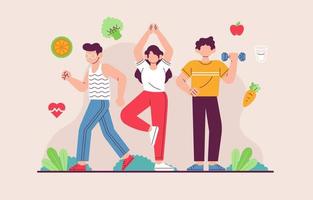Simplify for Healthy Living
Minimalism and Health: Decluttering Your Life for Peace of Mind
In a world filled with constant distractions, cluttered spaces, and overwhelming schedules, finding balance can feel like an uphill battle. Minimalism, a lifestyle focused on simplicity and intentionality, offers a refreshing solution. Beyond just organizing your home, embracing minimalism can significantly impact your physical health, mental clarity, and emotional well-being. This blog will explore how decluttering your life can lead to better health and practical steps to start your minimalist journey.
What is Minimalism?
Minimalism is the practice of intentionally simplifying your life by focusing on what truly matters. It involves removing excess physical items, commitments, and mental clutter to create space for clarity, peace, and purpose. This philosophy isn’t about deprivation—it’s about curating a life that aligns with your values and goals.
How Minimalism Improves Health
-
Reduces Stress and Anxiety:
Cluttered environments can create a sense of chaos, increasing stress levels. A tidy space promotes calmness and mental clarity, reducing feelings of overwhelm. -
Encourages Healthy Habits:
Minimalism helps you focus on essentials, like nutritious meals and regular exercise, by eliminating distractions that drain your time and energy. -
Improves Sleep Quality:
A clean, minimalist bedroom free of distractions promotes better sleep by creating a serene environment conducive to rest. -
Boosts Mental Clarity:
Simplifying your surroundings helps declutter your mind, enhancing focus and productivity. -
Fosters Emotional Well-Being:
Letting go of excess and unnecessary commitments can improve emotional resilience and foster a sense of freedom.
Practical Steps to Declutter Your Life
1. Declutter Your Physical Space
- Start Small: Begin with a single drawer, shelf, or corner of a room.
- Use the “Keep, Donate, Discard” Method: Assess each item and decide whether it serves a purpose, brings joy, or should go.
- Adopt the One-In-One-Out Rule: For every new item you bring into your home, let go of one you no longer need.
2. Simplify Your Schedule
- Prioritize Essentials: Focus on commitments that align with your values and bring fulfillment.
- Learn to Say No: Protect your time by declining activities that don’t serve your goals or well-being.
- Create Buffer Time: Leave room in your schedule for rest and spontaneous activities.
3. Declutter Your Mind
- Practice Mindfulness: Meditation, journaling, or yoga can help clear mental clutter and promote self-awareness.
- Digital Detox: Limit screen time, unsubscribe from unnecessary emails, and organize your digital files for a clearer headspace.
- Focus on Gratitude: Reflecting on what you have instead of what you lack reduces mental noise and fosters contentment.
4. Rethink Consumption Habits
- Buy with Intention: Before making a purchase, ask yourself if the item is necessary and adds value to your life.
- Embrace Quality Over Quantity: Invest in durable, versatile items instead of accumulating cheap, short-lived products.
- Limit Impulse Buying: Avoid shopping as a stress-reliever or boredom buster.
The Long-Term Benefits of Minimalism
- Improved Physical Health: A minimalist lifestyle encourages better organization, healthier eating, and more time for physical activity.
- Increased Emotional Resilience: Simplifying life reduces stressors, allowing you to better handle challenges.
- Financial Freedom: Spending less on unnecessary items frees up resources for meaningful experiences or long-term goals.
- Environmental Impact: Owning less and consuming mindfully reduces waste and promotes sustainability.
Getting Started: A Minimalist Challenge
If you’re ready to embrace minimalism, try this 30-day challenge:
- Day 1: Declutter your workspace.
- Day 2: Clean out your wardrobe—donate items you haven’t worn in a year.
- Day 3: Organize your pantry and remove expired items.
- Day 4: Set limits on your social media usage.
- Day 5: Dedicate 10 minutes to mindfulness or journaling.
Continue with similar small tasks each day, focusing on areas that matter most to you.
Conclusion
Minimalism isn’t just about owning fewer things—it’s about creating a life filled with purpose and clarity. By decluttering your space, schedule, and mind, you can cultivate a lifestyle that enhances your health and happiness.
Remember, minimalism is a personal journey. Start small, stay intentional, and watch as simplifying your life leads to a profound sense of peace and well-being.


